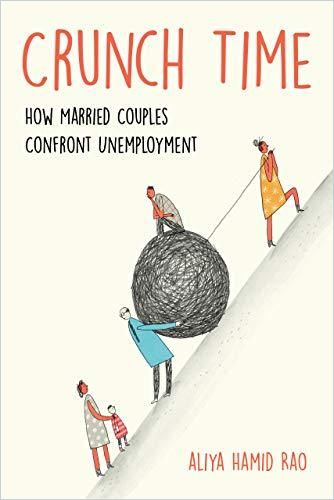Sociologist Alia Hamid Rao offers an insightful, telling study of how unemployed, well-off American couples revert to traditional gender roles under the strain of unemployment.

Marriage During Precarity
How do couples contend with a job loss? Aliya Hamid Rao, an assistant professor in the Department of Methodology at the London School of Economics, focuses on a neglected area of research: how unemployment affects affluent – or previously affluent – families. Some 92% of white-collar workers will face job loss at some point, Rao writes. When that occurs, she has learned, affluent Americans worry less about falling into poverty than about losing social status.
This fear leads many couples to cling to an obsolete vision of American life; rather than regarding joblessness as an opportunity for families to rearrange their dynamics, Rao finds unemployment reinforces unhealthy, unproductive and dated gender stereotypes and inequalities.
CHOICE called Rao’s work “a must read for students and scholars interested in the gendered negotiations and gendered patterns of work for pay and housework. The book is well researched and situated in the relevant literature, but it is also accessible and could be used in any undergraduate course on gender, work and the family…Essential.” The LSE Review of Books called it “… a necessary addition to the sociological research on unemployment that has been surprisingly lacking in a gendered/work-family lens…engagingly written and accessible to a wide audience.”
Precarity used to be a condition limited to low-wage workers, but it has now become endemic to the organization of work and the American labor market.Aliya Hamid Rao
During the Great Recession of 2007 to 2009, unemployment reached 10% and, the author reveals, white-collar joblessness lasted longer than the recession, especially for women. Changes in work and employment wrought by the Great Recession became permanent as organizations downsized and outsourced.
Losing a job, Rao writes, devastates affluent families and threatens their self-image and place in society. People enter marriages with gendered impressions of family life formed by race, social class and background. Her research indicates that under the stress of unemployment, wealthier families fall back on traditional gender stereotypes that designate men as the primary providers and frame paying work as optional for women.
Conform
Looking for a job, Rao believes, forces people to conform to the “ideal job-seeker norm”: the expectation that workers will devote significant time and energy to landing the best possible job, regardless of their financial security. She writes that the ideal job-seeker norm arose in response to growing employment insecurity. Companies are now aware of the expenses involved, including researching, recruiting, hiring, onboarding and retention.
The ideal job-seeker norm is an expectation imposed primarily by the contemporary labor market.Aliya Hamid Rao
Rao stresses that men fit the ideal job-seeker norm more readily than women because their support systems encourage and enable job searching. Men gain “moral standing” by devotion to regaining employment, but society expects women to find fulfillment in domestic rather than paid labor. Job hunting often takes place at home and, Rao learned, men and women fall back on gendered “cultural scripts” during uncertain and stressful times.
Hegemonic Masculinity
The couples in her study, Rao asserts, cling to the stereotype of “hegemonic masculinity”: The husband is the primary provider, the wife acts as chief homemaker and the couple live in a house in an affluent suburb.
The space of the home is inscribed as a feminine space through the everyday interactions and understanding of these couples, and men are often seen as trespassers. Aliya Hamid Rao
Paid employment, the author emphasizes, equals respectability; affluent families lack cultural scripts for how men should function at home while looking for work. Thus, couples must navigate unfamiliar terrain while prioritizing reemployment, even though they may have little experience in coping with the stress of unemployment and loss of status.
Idealized Identity
Rao discloses that white middle- and upper-middle-class Americans often reframe a woman’s unemployment as an opportunity for her to be a devoted wife and mom. Women in difficult financial straits find that staying at home threatens their financial independence.
Women and their husbands frame women’s unemployment as enabling women to correct an imbalance in their work-family life that has resulted directly from the woman’s employment.Aliya Hamid Rao
Long, unsuccessful job searches, Rao recounts with sensitivity, debilitate a person’s self-regard. For example, Rao cites how one couple, Tamara and Kevin Goldberg, used the question, “How was your day?” as shorthand for taking each other’s emotional temperature during a spell of unemployment.
Domestic Obligations
Rao concludes that unemployed women rarely have the time, support or resources to be ideal job-seekers.
From the social interaction perspective on gender, chores are a locus through which men and women perform their gender identity, primarily in order to have this identity validated by others.Aliya Hamid Rao
Women bear more responsibility for child care and do more domestic work than men, even when men make less money or are jobless. Housework and child care remain markers of gender identity, especially during unemployment. Gender displays, Rao dissects, result from society’s ideas about femininity and masculinity – and white, affluent, heterosexual couples tend to conform to those ideas.
Debilitated Self-Image
Aliya Hamid Rao explores a realm few others have plumbed – the reactions within well-to-do families facing unfamiliar joblessness. Her focus is on how gender affects couple dynamics, self-image, function in the job market and behavior in society. Many of the couples she studied reacted with shock at their sundered privilege. Men tended to express profound frustration to find their monetary value – and thus their societal worth – inexplicably (to them) reduced so drastically. Few seem to have anticipated this situation or to possess superior coping skills, hence, according to Rao, their reversion to dated gender norms.
Rao is an academic and writes like one. Her prose can be unnecessarily convoluted and at times she defaults to jargon. Even so, hers is a fascinating study, and one that will provide HR officials and corporate leaders with worthwhile insights into the formerly unemployed people they may hire and lead.
Works of parallel interest include American Hookup: The New Culture of Sex on Campus by Lisa Wade; Making Motherhood Work: How Women Manage Careers and Caregiving by Caitlyn Collins; and Second Shift: Working Families and the Revolution at Home by Arlie Hochschild with Anne Machung.











